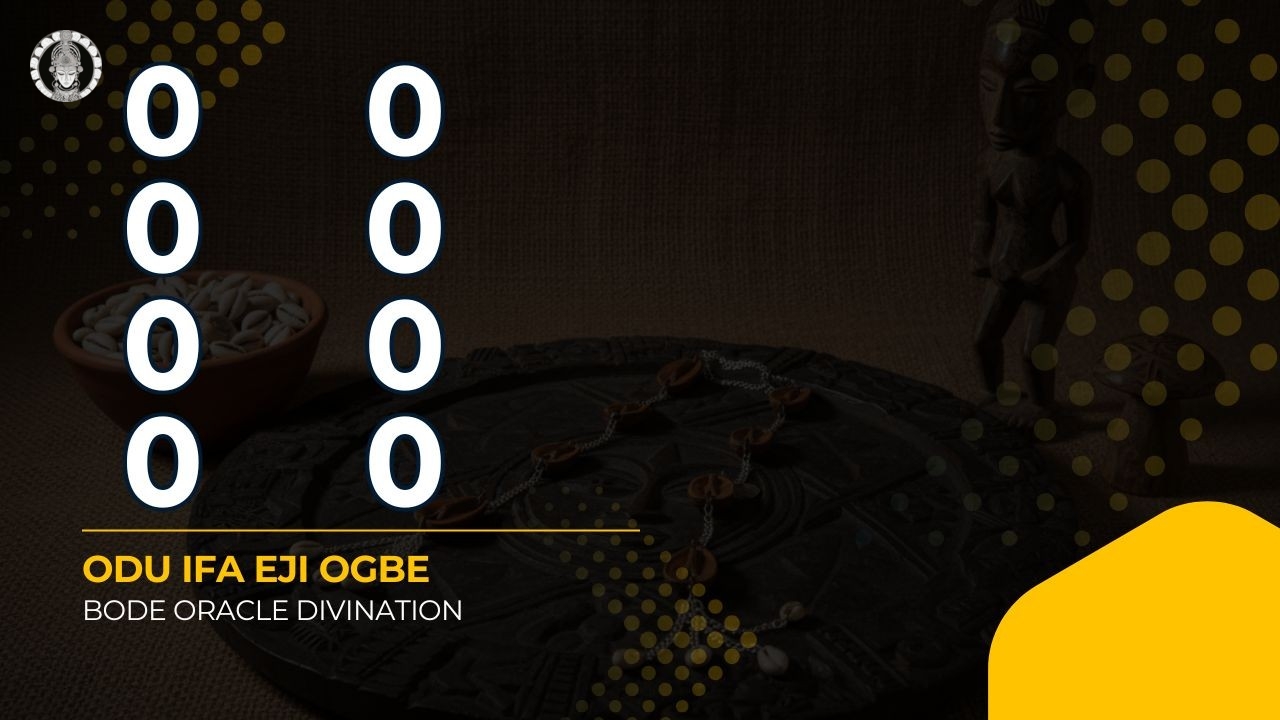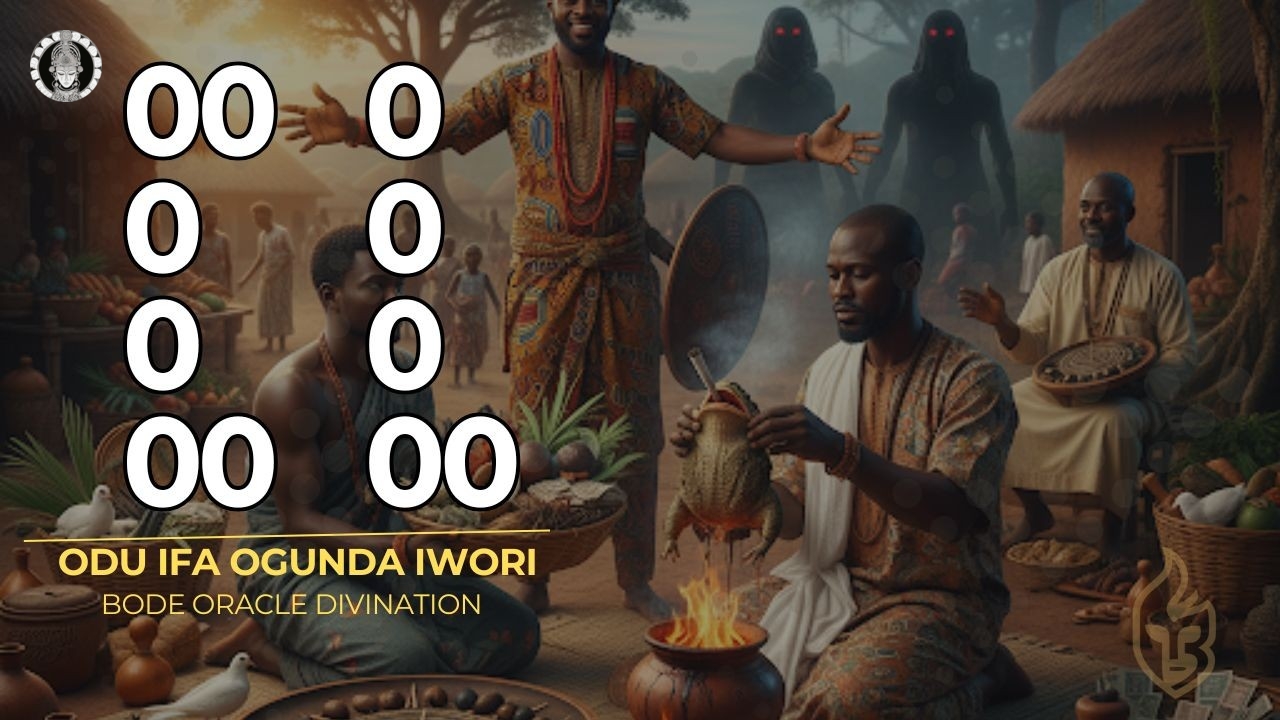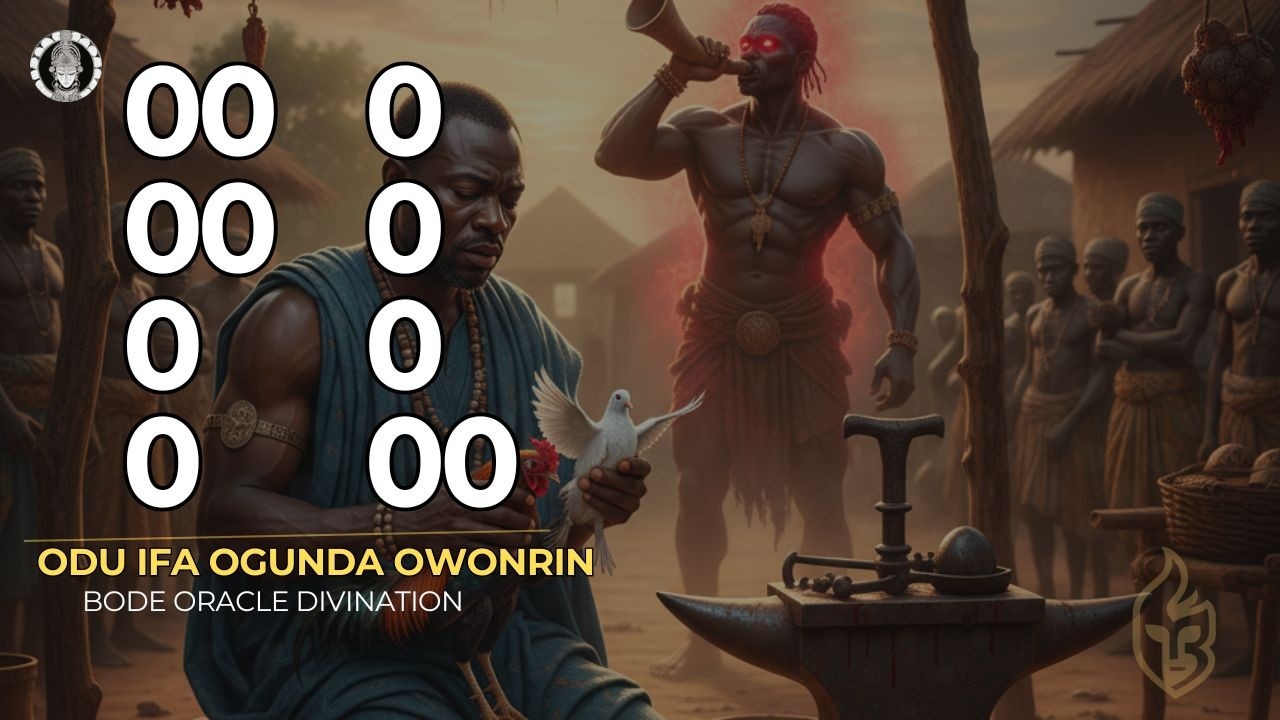Introduction to Odu Ifa Ogunda Owonrin
Odu Ifa Ogunda Owonrin represents one of the 256 sacred divination signs in the Ifa corpus. This powerful Odu carries profound messages about achieving wealth through workplace blessings, the critical importance of feeding Ogun deity for prosperity, protection from pursuing evil forces, and honoring ancestral tradition as the foundation of all blessings. Through the wisdom of Ogunda Owonrin, we learn how proper sacrifices at our workplaces sanctify our labor, how Ogun's satisfaction brings financial comfort, and how tradition (isese) serves as the gateway through which all spiritual blessings flow.
The divinations within Ogunda Owonrin address fundamental needs of modern life: success in business and investments, prosperity through one's work, spiritual protection when evil forces pursue us, and maintaining connection with ancestral wisdom. Each story demonstrates that compliance with Ifa's prescriptions, combined with courage to receive blessings, transforms ordinary circumstances into channels of prosperity and protection. For comprehensive understanding of the 16 Odu Ifa and their meanings, explore our detailed guide.
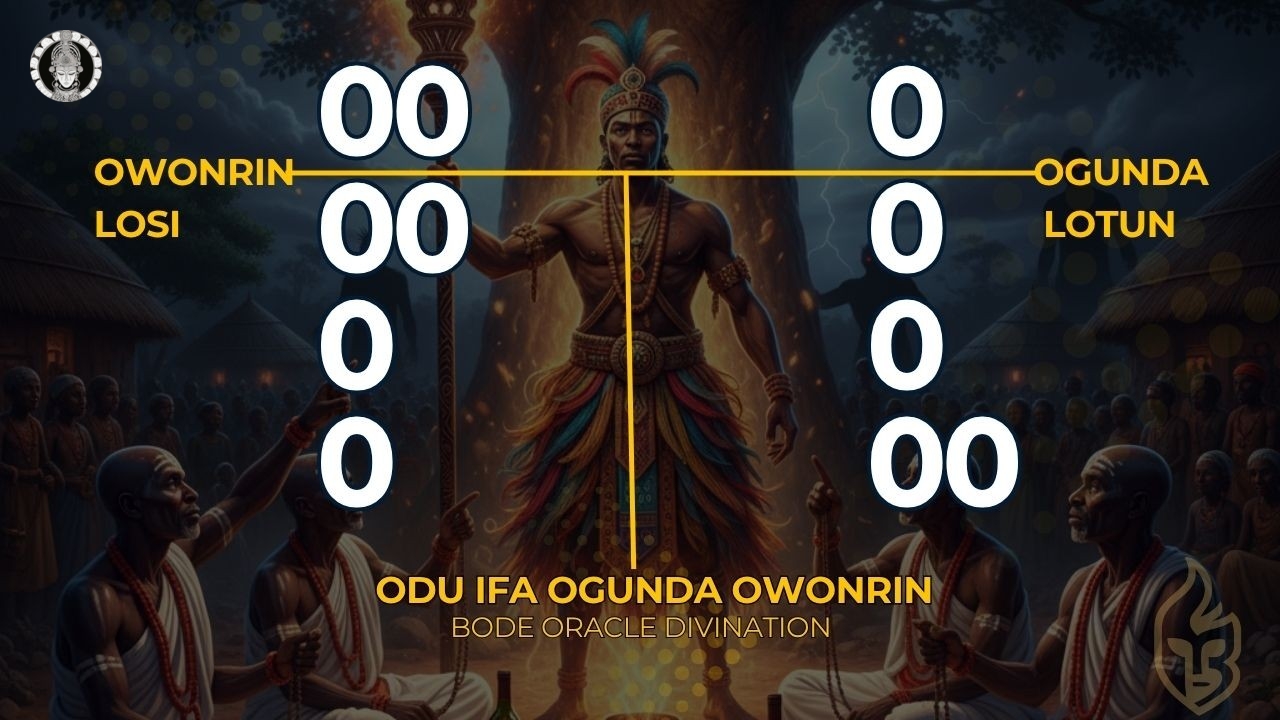
Ifa Divination for Omini: Workplace and Business Blessings
Understanding Workplace Sanctification
This divination from Ogunda Owonrin addresses a reality often overlooked in spiritual practice—the need to sanctify our workplaces and business ventures through sacrifice. Ifa reveals that the person receiving this Odu has invested in something, started a business, or embarked on a venture that requires spiritual blessing to flourish. The divination teaches that prosperity doesn't flow automatically through our efforts alone; the spaces where we work and the enterprises we undertake need spiritual alignment and divine favor.
The name Omini suggests "my water" or "my flowing substance"—representing the flow of blessings, resources, and prosperity that should move through one's life and work. Just as water flows to where channels are open, so too do blessings flow through spiritually prepared pathways. When we offer sacrifice at our workplace, we create a spiritual channel through which divine favor can flow into our material efforts.
The Power of Courage in Receiving Blessings
What makes this divination particularly profound is its emphasis on courage and confidence in receiving blessings. The verse concludes with the declarative statement: "I have the courage to receive blessings so that blessings will come my way." This teaches a fundamental spiritual principle: we must be internally prepared to receive what we request. Many people sabotage their own blessings through doubt, feelings of unworthiness, or fear of success and its responsibilities.
Ifa instructs that after performing sacrifice, we must boldly expect and claim the promised blessings. This is not arrogance but spiritual confidence—trust that when we fulfill our part of the covenant (sacrifice), the divine will fulfill its part (blessing). The courage to receive is as important as the willingness to sacrifice.
The Sacred Verse
Pengele mole hun se keke ke mole reru
Iteledi eni lawo bo ti laro loju si
Ewawo aso mi toko nan yanran yanra biaso oba
Adifafun omi mi omini
Tiise eru oje lepetu
Ebo won ni ose
O si gbeboni be orubo
Nje omimi mi omi mi
Mojinwo ewa gbemi
English Translation
Pengele mole hun se keke ke mole reru
Iteledi eni lawo bo ti laro loju si
Come and see my resplendent clothing like the king's
Ifa divination for Omimi mi Omini
Being the servant of Oje Lapetu
He was asked to offer the sacrifice
And he complied
Therefore, my great Omimi
I have the courage to receive blessings so that blessings will come my way
The Symbolism of Resplendent Clothing
The reference to "resplendent clothing like the king's" carries powerful symbolism about the transformation that workplace blessings bring. Clothing represents our external presentation, social status, and the image we project. When Ifa promises clothing as resplendent as the king's, it speaks to elevation from ordinary worker to honored professional, from struggling entrepreneur to successful business person. This is prosperity that others can see—blessings that manifest visibly in improved circumstances and enhanced status.
Prescribed Offerings (Ebo)
For workplace and business blessings, Ifa prescribes a dove (eyele), a hen (agbebo adie), and money (opolopo owo). The dove represents peace and the smooth flow of business operations without conflict. The hen symbolizes productivity and multiplication—hens lay eggs regularly, representing businesses that generate consistent returns. The money serves both as practical offering and as spiritual seed—giving money to receive multiplied financial returns.
Critically, Ifa instructs that the sacrifice must be offered at the workplace or business location itself. This is not sacrifice performed at home or at the Babalawo's shrine alone; it must be brought to the actual site where work occurs. This sanctifies that specific space, establishing it as a channel for divine blessing rather than just a secular location.
Modern Application for Contemporary Business
In modern context, this Odu speaks powerfully to entrepreneurs, business owners, employees seeking promotion, and anyone who has made investments requiring returns. The principle of workplace sanctification adapts across industries and professions. For an office worker, it might mean a small discrete offering in one's work area. For a business owner, it could be a ceremony at the business location. For someone working from home, it means sanctifying the home office space.
The divination also addresses investments—whether in stocks, real estate, or business ventures. When we invest resources, we create spiritual partnerships between our material efforts and divine favor. The sacrifice activates this partnership, ensuring that our investments yield returns. For more on wealth-attracting practices, explore teachings at our dedicated Ogunda Owonrin page.
Ifa Divination for Memun: Feeding Ogun for Wealth and Prosperity
Understanding Ogun's Role in Material Prosperity
This divination from Ogunda Owonrin reveals the specific connection between Ogun worship and financial prosperity. Ogun, the Orisa of iron, war, technology, hunting, and all work involving metal or tools, holds unique jurisdiction over wealth earned through labor, industry, and technological enterprise. In contemporary society where most wealth flows through work, industry, and technology, Ogun's relevance has only increased. The divination teaches that feeding Ogun—particularly with palm wine—is essential for anyone seeking wealth through their labor.
The name Memun plays on words related to palm wine (emun) itself, suggesting "the one who takes/receives palm wine." This indicates that the divination specifically addresses the relationship between Ogun, palm wine offerings, and the resulting prosperity. The verse explicitly states: "It was when Ogun took palm wine that the priest felt comfortable"—establishing a direct causal relationship between satisfying Ogun and experiencing financial comfort.
The Spiritual Significance of Palm Wine
Palm wine (emun) holds special status in Yoruba spiritual practice, particularly in Ogun worship. Unlike water or other liquids, palm wine represents celebration, community gathering, and the fruits of labor—palm trees require planting, care, and skillful harvesting. Palm wine ferments quickly and must be consumed fresh, representing the immediate, tangible rewards that work should bring.
For Ogun specifically, palm wine serves multiple symbolic functions. It acknowledges Ogun's role as provider of tools that make work possible. It celebrates the harvest that tools enable. It provides refreshment for the deity whose energy enables all productive labor. When Ogun receives palm wine, he experiences satisfaction and joy, which he then reciprocates by ensuring the worshiper's labor produces abundance.
The Sacred Verse
Esure abita rugudu
Ata tokunni tepa
Epa lotatan lofiibi jannanjannan gbadi
Adifafun memun ko riwa
Tii se are mogun
Igba ti n momi oju sogbere aje
Ebo won ni ose
O si gbebonibe orubo
Nje, ero ipo
Ero ofa
Igba ogun gbemun mu lara ro awo
English Translation
Esure abita rugudu
Ata tokunni tepa
Epa lotatan lofiibi jannanjannan gbadi
Ifa divination for Memun ko riwa, take wine and be blessed
Being the president of Mogun
When he was crying for the blessing of wealth
He was asked to offer the sacrifice
And he complied
Therefore,
Pilgrims of Ipo
Pilgrims of Ofa
It was when Ogun took palm wine that the priest felt comfortable
The Promise of Comfortable Living
The conclusion of this verse—"it was when Ogun took palm wine that the priest felt comfortable"—reveals Ifa's understanding that wealth should produce comfort, not just accumulation. The Yoruba concept of "feeling comfortable" (ara ro) encompasses financial security, peace of mind, freedom from anxiety about resources, and the ability to live with dignity and ease. This is wealth that transforms quality of life rather than merely increasing numbers in accounts.
The divination promises that when Ogun receives proper honor through palm wine and sacrifice, he ensures that the worshiper's work produces not just income but comfortable living. This includes steady employment, successful business, fair compensation, and the wisdom to manage resources well. Ogun's blessing creates stability—work that continues, income that flows regularly, and accumulation that endures.
Prescribed Offerings (Ebo)
For attracting wealth through Ogun's favor, Ifa prescribes a dove (eyele), a rooster (akuko adie), palm wine (emun), and money (opolopo owo). The rooster represents masculine energy, assertiveness in work, and the announcement of success—roosters crow at dawn, heralding the new day just as successful work heralds prosperity. The dove provides balance—peaceful coexistence with colleagues and smooth business relationships.
The palm wine is non-negotiable in this divination. It is the specific offering that Ogun requires for wealth blessings. The quantity should be generous—Ogun appreciates abundance and responds with abundance. Some practitioners also include kola nuts, bitter kola, and roasted yam, as these are traditional accompaniments to palm wine and create a complete feast for Ogun.
Modern Professional Application
This divination speaks powerfully to modern professionals across all fields involving tools, technology, or systematic work. Software engineers, mechanics, surgeons, contractors, manufacturers, drivers, and anyone whose work involves equipment or technology falls under Ogun's domain. The principle extends to all work requiring skill, precision, and productive energy.
For modern practitioners, feeding Ogun with palm wine might occur during annual ceremonies, before starting major projects, when seeking promotion, or when facing workplace challenges. The practice establishes ongoing relationship with Ogun rather than transactional requests. Regular small offerings maintain the relationship; major ceremonies address specific needs. For understanding Ogun's role in Yoruba cosmology, consult UNESCO's documentation on Ifa traditions.
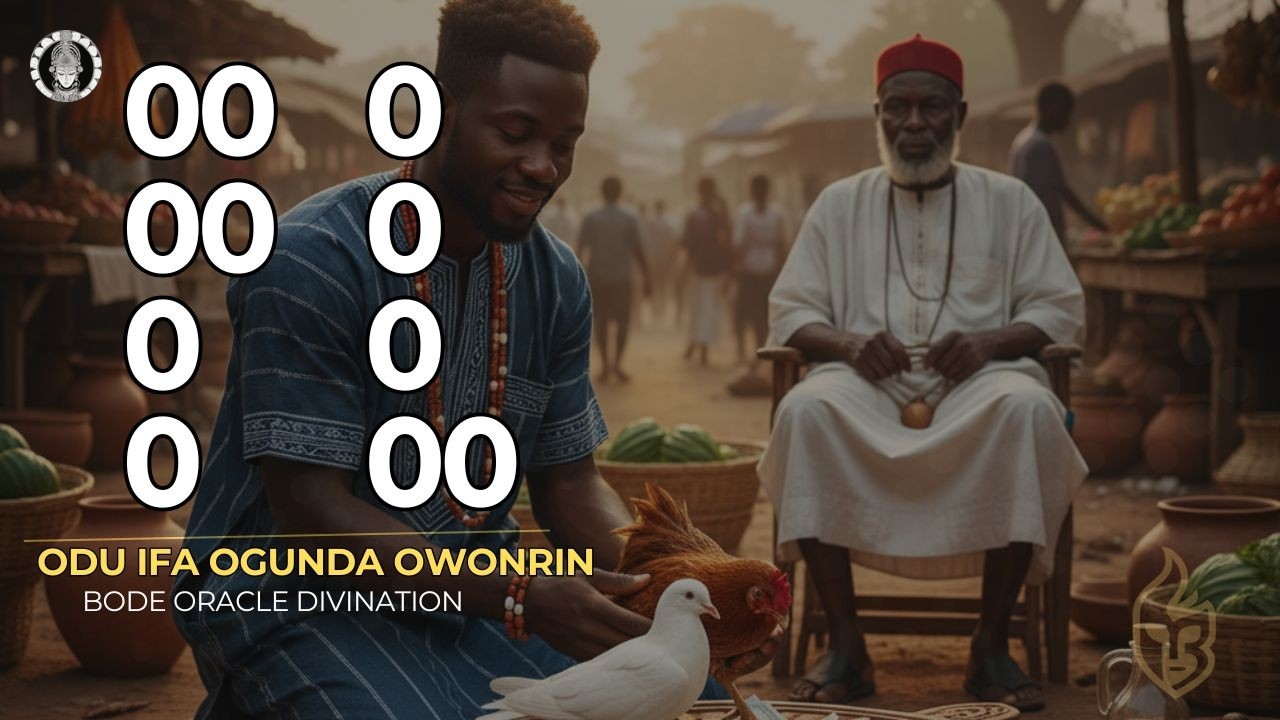
Ifa Divination for Isese: Honoring Tradition as Foundation of All Blessings
Understanding Tradition as Spiritual Gateway
This divination from Ogunda Owonrin presents one of the most profound teachings in Ifa philosophy—that ancestral tradition (isese) is not merely cultural practice but the fundamental gateway through which all spiritual blessings flow. Ifa declares unequivocally that one's father is tradition, one's mother is tradition, one's destiny is tradition, one's Ikin (Ifa divination tool) is tradition, and Olorun (the Supreme Being) is tradition. This establishes tradition as the universal principle underlying all existence and blessing.
The verse teaches "Tradition is the refuge where one seeks shelter before propitiating Ebora (deities). Tradition is the father of sacrifice (etutu)." This reveals that even our relationship with Orisa, even our sacrifices and spiritual practices, must be rooted in and flow through ancestral tradition. We cannot bypass tradition to reach the divine; tradition is the pathway itself.
The Primacy of Parental Honor
What makes this divination particularly striking is its instruction to propitiate one's biological parents (baba ati iya) with kola nuts and offerings before approaching other spiritual forces. This is revolutionary in societies where many people neglect their living parents while seeking spiritual blessings elsewhere. Ifa teaches that the blessing of one's parents—those who gave physical life—precedes and enables all other spiritual blessings.
The instruction to offer a ram to one's father (fi agbo bo baba re) represents substantial sacrifice, indicating the high spiritual value of parental blessing. In many cases, people inherit spiritual blockages or generational limitations because they have not properly honored their parents. This divination provides the remedy: honor parents, feed them spiritually and physically, receive their blessing, and watch as this unlocks all other spiritual doors.
The Sacred Verse
Okunsu nanre nanra
Osa su legbe legbe
Alasan rasan ala san n rasan
Agbagba imole ni o gbeyin oro
Wonripe kosun hin mo
Adifafun isese
Tise olori oro laye abuase se
Tii se olori oro lalade orun
Nje baba eni Asese
Iya eni Asese
Eni ori eni asese eni ni
Ikin eni asese eni ni
Olorun oba asese eni ni
Asese laabo nibe kato bo ebora
Asese ni baba etutu
English Translation
Okunsu nanre nanra
Osa su legbe legbe
Alasan rasan ala san n rasan
It is the elderly spirits that carry the burden of matters
They declared there is no more sleeping
Ifa divination for Tradition (Isese)
Who is the head of matters on earth and in heaven
Being the head of matters in the realm of ancestors
Therefore, one's father is tradition
One's mother is tradition
One's destiny is tradition
One's Ikin is tradition
Olorun the king is tradition
Tradition is the refuge where one seeks shelter before propitiating Ebora
Tradition is the father of sacrifice
The Universal Nature of Tradition
By declaring that everything from parents to Olorun is tradition, this verse establishes that tradition is not external custom but the fabric of existence itself. When we honor tradition, we align with the fundamental principles through which life and blessing flow. When we reject or neglect tradition, we sever ourselves from the source of spiritual power, regardless of what other practices we adopt.
This teaching has profound implications for diaspora communities and modern practitioners who sometimes seek spiritual connection while rejecting ancestral ways. Ifa teaches that there is no authentic spiritual power that bypasses ancestral foundation. We can adapt forms to contemporary context, but we cannot abandon the essential principles and relationships that tradition embodies.
Prescribed Offerings (Ebo)
For honoring tradition and unlocking its blessings, Ifa prescribes a ram (agbo), a rooster (akuko), a dove (eyele), and money (opolopo owo). The ram, the most substantial offering, goes to one's father or ancestral shrine. The rooster and dove represent communication and peace with ancestral forces. Additionally, Ifa instructs offering kola nuts (obi) to all Irunmole (spiritual forces) and specifically honoring one's parents.
Modern Application and Cultural Continuity
This divination speaks urgently to contemporary situations where people seek spiritual benefits while disconnected from their roots. It teaches that authentic power comes through ancestral channels, that innovation must build on foundation rather than replace it, and that the fastest path to blessing often runs through the seemingly slow work of honoring parents and tradition.
For practitioners navigating modern life while maintaining traditional values, this Odu provides validation and direction. It confirms that tradition is not obstacle to progress but the foundation enabling sustainable advancement. It teaches that before seeking external spiritual solutions, we must secure the blessing of our immediate ancestry. For scholarly perspectives on tradition's role in Yoruba spirituality, explore UNESCO's recognition of Ifa divination system.
Ifa Divination for Eera: Protection from Pursuing Evil Forces
Understanding Spiritual Pursuit by Evil Forces
This divination from Ogunda Owonrin addresses one of the most frightening spiritual situations—being actively pursued by evil forces (ajogun). The verse reveals that these forces are coming after the person, seeking to destroy them. However, Ifa provides powerful protection through the symbolism of the sugar ant (eera) and the actions of Aragbadu, who cuts the rope of death and diseases.
The choice of the sugar ant as the central symbol is profound. Ants are among the smallest creatures, seemingly vulnerable and easily destroyed. Yet they live remarkably long lives, build enduring colonies, and survive through community organization and persistent effort. The verse promises that like the ant "who will live long on the earth and above the earth," the person receiving this Odu will achieve protected longevity despite the pursuing evil forces.
The Spiritual Technology of Rope-Cutting
The divination introduces powerful spiritual technology: Orunmila called upon Gbandupe to help restore order, and Aragbadu came to cut the rope of death (jaku), disease (jarun), and loss (jasasara). This rope-cutting represents severing the spiritual connections that evil forces establish to drain life, cause illness, or create misfortune. The prescription to take a rope around one's head three times while invoking protection ritually enacts this severing.
The three-time rotation of the rope is not arbitrary. Three represents completion and manifestation in Yoruba numerology. By circling the head three times—the head being the seat of destiny and the primary target of spiritual attacks—the person creates a protected boundary that evil forces cannot penetrate. The rope that could bind becomes the rope that protects through proper ritual transformation.
The Sacred Verse
Kere kere lekuja wo
Adifafun eera ti o seruko ako pole pe titi
Eera ti o se akapo ile petiti
Lodifafun ojugun to yo nuntan
To fi kun eyin gbendu
Ojugun toyonuntan to fikuneyingbendu
Lodifafun Orunmila
Nijo ajogun lan sedi nan ile baba re
Ebo won ni ose
O gbebo nibe orubo
Orunmila lole kesi ara gbandupe
Kowa ba oun tunle baba oun se
Aragbadu lole kesi awon toba kopa ka file pa
Toba kele ka filele aye ko pa elelogba
Adifafun Aragbadu ti o lo le jakun iku
Nje aragbadu mo jaku
Mojarun mojasasara
English Translation
Kere kere lekuja wo
Ifa divination for the sugar ant
Who will live long on the earth and above the earth
Ifa divination for Ojugun who was comfortable
And who was moving up and down
Ifa divination for Orunmila
The day that evil forces (ajogun) were pursuing him
He was asked to offer the sacrifice
And he complied
It is Orunmila who stepped forward to call Gbandupe
To come and help him restore his father's house
It is Aragbadu who stepped forward to call others for the work
If it is about to happen that one must die
Ifa divination for Aragbadu who will go and cut the rope of death
Therefore, Aragbadu, I have cut the rope
I have cut the rope of diseases
The Power of Community in Spiritual Warfare
The divination reveals that Orunmila didn't face the pursuing evil forces alone. He called Gbandupe for help, who in turn called Aragbadu, who called others. This teaches that spiritual protection often requires community—multiple spiritual forces working together. The person receiving this Odu should not isolate themselves but should call upon their spiritual community, their Babalawo, and the collective power of Ifa for protection.
Prescribed Offerings (Ebo)
For protection from pursuing evil forces, Ifa prescribes a goat (ewure), a rooster (akuko adie), a dove (eyele), and money (opolopo owo). The goat represents substitution—it satisfies the pursuing forces in place of the person. Critically, Ifa instructs feeding Ifa with the goat and taking a rope around one's head three times while invoking the protection demonstrated in the verse.
Modern Application and Spiritual Warfare
This divination speaks to contemporary situations where people experience persistent misfortune, recurring illness, or the sense that they are under spiritual attack. It provides both diagnosis (ajogun pursuit) and remedy (proper sacrifice combined with rope ritual). The promise of longevity despite vulnerability (like the ant) offers hope to those feeling overwhelmed by opposition. For deeper understanding of protective practices in Yoruba tradition, consult comprehensive documentation on Ifa philosophy.
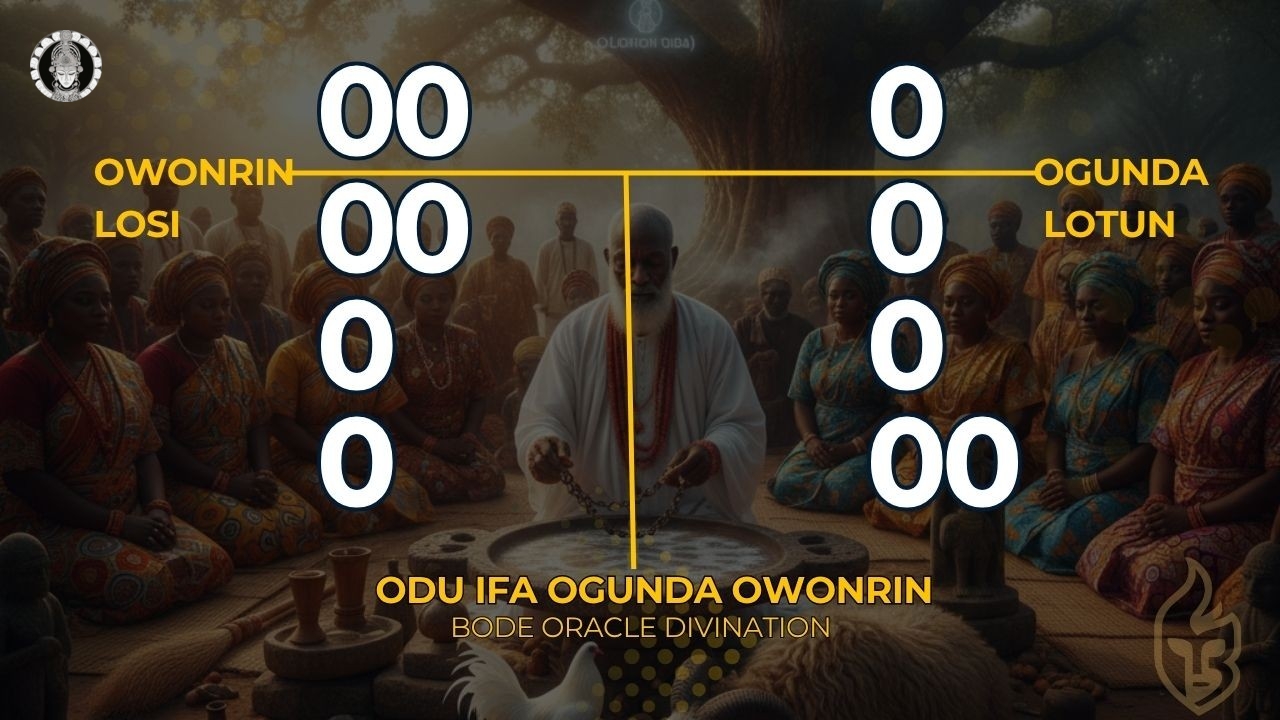
Akose and Spiritual Preparations of Ogunda Owonrin
Understanding Akose in Ifa Practice
Akose refers to spiritual preparations or medicinal formulations that combine herbal, mineral, and sometimes animal substances with spiritual invocations to produce specific results. Unlike ebo (sacrifices) which are offered to spiritual forces, akose are preparations that the person uses directly—bathing with them or applying them to the body. The akose of Ogunda Owonrin are particularly powerful for attracting prosperity and defeating enemies.
Akose Awure Ola: Preparation for Wealth and Honor
This akose is specifically designed to attract prosperity, honor, and fortune (ola) into one's life. The preparation involves combining multiple spiritually potent elements and using them in daily bathing to align one's energy with abundance.
Ingredients and Preparation
The akose requires akisan herbs, locust bean seeds (iru woro), eru Alamo, omonigbedegede herbs, sea sand (yanrin oku), and lagoon sand (yanrin osa). These ingredients are ground together with black soap (ose dudu). The mixture is used for bathing every morning.
Spiritual Significance of the Ingredients
Akisan herbs are known in Yoruba herbal medicine for their wealth-attracting and success-bringing properties. Locust bean seeds (iru woro) represent patience and the accumulation of small gains into substantial wealth. Eru Alamo provides spiritual authority and commanding power. Omonigbedegede herbs enhance attraction and magnetic personality.
The inclusion of two types of sand—sea sand and lagoon sand—is particularly significant. Sand represents accumulation (countless grains coming together), stability (firm foundation), and abundance (the seemingly infinite quantity at beaches). Using sand from both sea and lagoon symbolizes attracting wealth from multiple sources and all directions. The sea represents vast, far-reaching opportunities, while the lagoon represents local, accessible resources.
The Role of Black Soap
Black soap (ose dudu) serves as both binder and spiritual cleanser. Traditional Yoruba black soap contains ash and specific herbs that provide spiritual cleansing beyond physical washing. By grinding the wealth-attracting ingredients with black soap, the preparation simultaneously cleanses away spiritual blockages to prosperity while attracting new abundance. Each morning bath becomes a renewal—washing away yesterday's limitations while welcoming today's opportunities.
Morning Bathing Ritual
The instruction to bathe with this preparation every morning (larolaro) establishes daily spiritual fortification. Mornings represent new beginnings, fresh opportunities, and the start of productive activity. By bathing each morning with this powerful preparation, the person begins each day spiritually aligned with prosperity consciousness, cleansed of blocking energies, and magnetized to attract wealth opportunities that day will bring.
Akose Isegun Ota: Preparation for Victory Over Enemies
This akose is designed for protection and victory over enemies, ensuring that opposition's plans fail and that the person remains secure and triumphant.
Ingredients and Preparation
The akose combines two bitter kolas (orogbo meji), two alligator peppers (atare meji), two kola nuts (obi ajopa meji), and one solid alligator pepper (atare kan odidi). These are ground together and used to make twenty-one incisions in the middle of the head.
Spiritual Significance of the Ingredients
Bitter kola (orogbo) represents endurance, longevity, and the ability to withstand bitterness without being defeated. In Yoruba spirituality, bitter kola is used to "kill" negative forces and neutralize attacks. Alligator pepper (atare) provides spiritual heat, power, and the authority to command circumstances. Kola nuts (obi) represent communication, clarity, and the ability to discern truth from deception.
The use of paired quantities (two of each) represents balance and completeness, while the single solid alligator pepper represents concentrated, focused power at the core of the preparation. This combination creates comprehensive protection—endurance from bitter kola, power from alligator pepper, clarity from kola nuts—all working together.
The Significance of Twenty-One Incisions
The number twenty-one (ọdún mọ́kànlelogún) holds special significance in Yoruba numerology. It represents three times seven, with seven being the number of completion and perfection in many spiritual traditions. Twenty-one incisions create complete, perfected protection. The placement "in the middle of the head" (arin ori) is critical—this is the crown, the highest point, where one's destiny resides. By placing this powerful preparation at the crown, the person establishes spiritual authority and protection from the highest point of their being.
Important Considerations for Akose Use
Both akose preparations should only be prepared and used under the guidance of a qualified Babalawo who can properly invoke the necessary incantations and ensure correct preparation. The spiritual power of akose comes not just from the physical ingredients but from the prayers (ofo), invocations (igbale), and spiritual knowledge that accompany their preparation and use.
Additionally, some ingredients may need adaptation for modern availability or individual circumstances. A knowledgeable practitioner can suggest appropriate substitutions that maintain spiritual effectiveness while accommodating contemporary realities. The principle remains constant even when specific ingredients vary: alignment with spiritual forces through material offerings and ritual practice manifests desired outcomes. For understanding the scientific and systematic aspects of Ifa practice, explore research on Ifa divination codes.
Additional Resources
Internal Links
- Complete Guide to Ogunda Owonrin - Detailed information, taboos, and practices
- Complete Odu Ifa Directory
- Bode.ng Blog - Extensive collection of Ifa and Yoruba spirituality articles
- Bode.ng - Main platform for divination services and community
External Resources
- African Traditional Religions: Ifa Divination - Duquesne University
- Ifa of the Yoruba People of Nigeria - UNESCO Archives
- Algebraic Characterization of Ifa Main Divination Codes
- UNESCO Recognition of Ifa Divination System
- Ifa Divination System - Wikipedia
- Opon Ifa (Divination Tray) - Wikipedia
Connect With Us on Social Media
- BODE Oracle on TikTok
- BODE Oracle on YouTube
- BODE Oracle on Facebook
- BODE Oracle on X (Twitter)
- BODE Oracle on Pinterest
Visit Bode.ng to explore more divination teachings, participate in quizzes and polls, and connect with our community of practitioners and learners. Register today to access exclusive content and personalized guidance on your spiritual journey.
Frequently Asked Questions And Answers About Odu Ifa Ogunda Owonrin
Find answers to common questions about this sacred Odu Ifa and its divination teachings
Ogunda Owonrin is one of the 256 sacred Odu (divination signs) in the Ifa corpus. It carries powerful messages about wealth attraction, workplace blessings, feeding Ogun deity for prosperity, protection from evil forces (ajogun), and the critical importance of honoring ancestral tradition (isese). This Odu teaches that through proper sacrifice and maintaining relationship with Ogun, one can achieve financial success, business prosperity, and protection from all forms of evil.
The divination of Omini in Ogunda Owonrin specifically addresses workplace blessings and business investments. Ifa promises that through proper sacrifice using a dove and hen, combined with offerings at one's workplace, business ventures and investments will be blessed. The verse teaches that one must have courage to receive blessings, and when sacrifices are offered at the place of work, prosperity flows through that channel.
The divination of Memun in Ogunda Owonrin reveals that Ogun must be fed with palm wine (emun) to attract wealth. Ifa promises that when Ogun receives palm wine and proper sacrifice (rooster and dove), the deity who presides over work, iron, and technology ensures comfortable living and financial prosperity. The verse states 'it was when Ogun took palm wine that the priest felt comfortable,' showing the direct connection between honoring Ogun and receiving wealth.
The divination about Tradition (Isese) in Ogunda Owonrin teaches that ancestral tradition is the foundation of all blessings. The verse declares 'One's father is tradition, one's mother is tradition, one's destiny is tradition, one's Ikin is tradition, Olorun the king is tradition.' Ifa instructs propitiating one's parents (baba ati iya) and all Irunmole with kola nuts and offering a ram to one's father. This establishes that tradition is the gateway through which all other blessings flow.
The divination of the Sugar Ant (Eera) in Ogunda Owonrin addresses protection from evil forces pursuing the person. Ifa prescribes feeding Ifa with a goat and taking a rope around one's head three times while invoking protection. The verse teaches that just as Aragbadu cut the rope of death and diseases, proper sacrifice combined with Ifa's protection severs all connections to evil forces. The ant's ability to live long despite its small size represents protected longevity.
The sugar ant (eera) in Ogunda Owonrin symbolizes longevity, persistence, and protection despite apparent vulnerability. Ants live long lives, build enduring colonies, and survive through community organization rather than individual strength. The divination teaches that like the ant that 'will live long on the earth and above the earth,' those who receive this Odu can achieve protected longevity even when evil forces pursue them, through proper spiritual fortification.
Akose Awure Ola is a spiritual preparation for attracting wealth and honor. It combines akisan herbs, locust bean seeds (iru woro), eru Alamo, omonigbedegede herbs, sea sand (yanrin oku), and lagoon sand (yanrin osa), ground together with black soap. This mixture is used for bathing every morning. Each ingredient carries specific spiritual properties for wealth attraction, with the two types of sand representing accumulation from multiple sources and black soap providing spiritual cleansing.
Akose Isegun Ota is a spiritual preparation for victory over enemies. It combines two bitter kolas (orogbo meji), two alligator peppers (atare meji), and two kola nuts (obi ajopa meji), along with one solid alligator pepper. These are ground together and used to make twenty-one incisions in the middle of the head. The number twenty-one represents completeness (three times seven), and placing this powerful preparation at the crown of the head establishes spiritual authority and protection from all enemies.
The phrase 'I have the courage to receive blessings so that blessings will come my way' from the Omini divination teaches that receiving blessings requires internal readiness and confidence. Many people sabotage their own blessings through doubt, unworthiness, or fear of success. Ogunda Owonrin instructs that after performing sacrifice, one must boldly claim and expect the promised blessings, creating the spiritual and psychological space for prosperity to manifest.
Ogunda Owonrin emphasizes several behavioral principles: honor your parents and ancestral tradition as the foundation of all blessings, feed Ogun regularly for workplace and financial prosperity, make sacrifices at your place of work to sanctify that space, maintain courage and confidence in receiving blessings, protect yourself spiritually when evil forces pursue you, and remember that compliance with Ifa's prescriptions transforms knowledge into actual blessing. The Odu teaches that spiritual practice must be active rather than passive.
All sacrifices (ebo) and spiritual preparations (akose) in Ogunda Owonrin should be performed under the guidance of a qualified Babalawo. The priest ensures proper procedures, invokes necessary incantations, and determines appropriate locations for offerings—particularly workplace sacrifices. Different divinations within Ogunda Owonrin address different challenges (wealth, workplace success, protection from evil, honoring tradition), each requiring specific offerings and procedures. The spiritual power comes from both materials and prayers combined.
Palm wine (emun) holds special significance in Ogunda Owonrin as the specific offering that Ogun requires for wealth blessings. Unlike water or other liquids, palm wine represents celebration, community, and the fruits of labor (as it comes from palm trees that require care and harvesting). The verse explicitly states that it was when Ogun received palm wine that prosperity manifested. Palm wine symbolizes the sweetness and joy that wealth should bring, not just material accumulation.
You can explore comprehensive information about Ogunda Owonrin through several resources:
- Complete Guide to Ogunda Owonrin - Detailed taboos and practices
- Complete Odu Ifa Directory
- Bode.ng Blog - Extensive articles on Ifa spirituality
- Bode.ng - Access divination services and community resources
Connect with us on social media for regular teachings: TikTok, YouTube, Facebook, X (Twitter), and Pinterest @BODEOracle.
